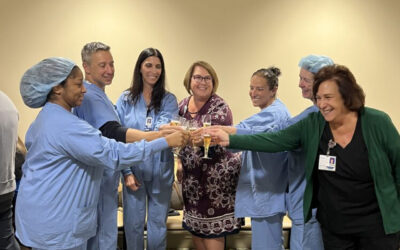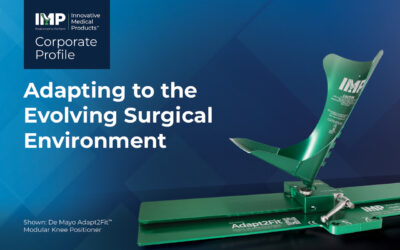
The Prodeon Medical, Inc. (PMI) initiative was started in 2016 with the mission of rethinking the treatment of the lower urinary tract symptoms (LUTS) due to Benign Prostatic Hyperplasia (BPH), or more commonly referred to as “enlarged prostate”. PMI’s first product, the Urocross™ Expander System is a minimally invasive device under development[1]. The procedure referred to as Prostatic Urethral REshaping (PURE) uses a temporary implant intended to rapidly relieve symptoms. The implant is placed in the prostatic urethra using flexible cystoscopy, and because there is not a permanent foreign body or damage caused to any anatomical structures such as the bladder neck, the procedure does not preclude future treatment choices.
OR Today Editor John Wallace recently interviewed well-known urologists Drs. Bilal Chughtai, Dean Elterman, and Daniel Rukstalis with a focus on PMI (www.ProdeonMedical.com).
Dr. Rukstalis is an experienced urologic oncologist at Prisma Health in Columbia, South Carolina. He specializes in the diagnosis and management of both benign and malignant disorders of the urinary tract, with a focus on minimally invasive surgery, advanced interventional imaging, and interventional urologic procedures such as targeted biopsy and ablation of tumors. Dr. Chughtai is an associate professor of urology and an associate professor of urology in obstetrics and gynecology at Weill Cornell Medicine. He is also an associate attending urologist at New York-Presbyterian Hospital. He specializes in voiding dysfunction, female urology, and neuro-urology. Dr. Elterman completed his medical degree followed by residency in urologic surgery at the University of Toronto. He became a fellow of the Royal College of Physicians and Surgeons of Canada in 2011. He completed a two-year fellowship in voiding dysfunction, neuro-urology, female urology and pelvic reconstruction at Memorial Sloan-Kettering Cancer Center and New York Presbyterian Hospital/Weill Cornell Medical College in New York City.
Question: With a priority of overall bladder health, what future considerations might we see from patients and doctors regarding their treatment decision process?
Rukstalis: In the United States, medications have become the mainstay for managing symptoms associated with BPH. Common symptoms include frequent or urgent need to urinate, increased frequency at night, and difficulty starting to urinate. Medications cannot physically remove the obstruction that has been created by the prostatic tissue. The population is living longer and theoretically patients could be taking medications for longer periods. Over time, some medications are associated with a deterioration in the function of the bladder. Therefore, with new therapeutics, there is an opportunity to define an optimal balance between 1) symptom management with medications and 2) a mechanical procedure that addresses the obstruction.

Question: There are many exciting Minimally Invasive Surgical Therapies (MIST) in development for treating symptoms secondary to BPH. How do you envision the paradigm of your future treatment offering?
Chughtai: This is a chronic disease that will benefit from having new choices. I envision offering multiple therapeutic options based on varying mechanisms of action. Prostatic Urethra REshaping (PURE) could become a compelling option. The initial data is very exciting and seems like a promising option to offer patients.
Question: What will be important for you to consider a MIST technology earlier in the treatment paradigm?
Chughtai: The new MIST options are very exciting in that they offer high amounts of clinical benefit with less risk than the gold standard surgery called transurethral resection of the prostate (TURP). An option that does not close any clinical doors would allow me to offer this to my patients sooner in the clinical pathway. A lot of patients are worried about the safety of any procedure and sometimes they go through great lengths to compensate within their daily lives with the bothersome urinary symptoms. However, a procedure that allows for future therapeutic options would allow for possible earlier use with these patients.
Question: Do you think it will one day become the norm to offer MIST earlier in the treatment paradigm?
Elterman: There is evidence that untreated bladder outlet obstruction leads to permanent and irreversible damage to the bladder. As MISTs become better designed, less invasive, easier to insert and tolerate, I see a shift of placing a prostatic implant as preferable, more efficacious, and perhaps even more cost-effective than daily medical therapy.
Question: You are currently participating in research of the Urocross Expander System, what interests you about that technology?
Elterman: The Urocross Expander System is unique amongst the MISTs in that it’s compatible with many existing flexible cystoscopes which a clinic may already own. The technology is designed to be a temporary implant; thus, no permanent foreign body is retained. This leaves future options open if re-treatment is required years down the road.
Question: Men will have many choices in the future, what do you see as being the deciding factors?
Elterman: I believe patients and urologists will want to choose treatments which ameliorate symptoms, preserve sexual function, and have limited side-effects. Ideally the device should be easy to insert and just as easy to retrieve allowing for future treatments, even perhaps with the same device years later.

Question: How was the company formed?
Edwards: In August 2021, Prodeon Medical, Inc (PMI) was spun out of a medical device incubator known as MedeonBio, Inc. The genesis of this program began with initial concepts from a prominent urologist in 2016. After having successfully completed a feasibility study, the Company is now at a key inflection point as we prepare for our US pivotal study.
Question: What is the unique value proposition of your technology?
Edwards: Our Benign Prostatic Hyperplasia (BPH) program developed a novel therapy, the Prostatic Urethra REshaping (PURE) procedure, using the Urocross™ Expander System and the Urocross Retrieval Sheath. The PURE procedure is a minimally invasive therapy that uses a delivery catheter to deploy a nitinol implant in the prostatic urethra. The Urocross Expander System is indicated for the treatment of men who are experiencing lower urinary tract symptoms (LUTS) associated with BPH. The implant is designed to be retrieved using the Urocross Retrieval Sheath. The unique value proposition focuses on delivering a therapy with several key goals in mind:
- Is performed using a flexible cystoscope maintaining patient comfort peri- and post-procedure
- Provides rapid resolution of symptoms
- Minimizes need for post-procedural catheterization and allows patients to promptly return to normal activities
- Preserves sexual function
- Preserves the bladder neck. Bladder neck preservation potentially avoids the scarring and subsequent strictures. Preservation of the bladder neck also mitigates the potential of a side effect known as retrograde ejaculation. When asked, all sexually active men prefer to maintain normal antegrade ejaculation
- Does not leave a permanent implant in the body. Minimizes potential of future encrustation and losing patients to follow-up
- Most importantly, the PURE procedure using the Urocross Expander System preserves future treatment options, if needed.
Question: What are the next steps for the company?
Edwards: PMI recently completed enrollment in a feasibility study known as the Expander-1 study. The next phase for the Company will be to commission a pivotal study in North America to assess the safety and efficacy of the Urocross Expander System and the Urocross Retrieval Sheath in a randomized and controlled clinical trial.
[1] CAUTION: Prodeon Medical Inc. products are for Investigational Use Only and are not for sale in the U.S. or outside the U.S



![[Sponsored] Company Showcase: Prodeon Medical](https://ortoday.com/wp-content/uploads/2021/11/prodeon-1-1080x675.jpg)





